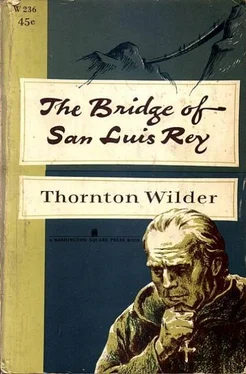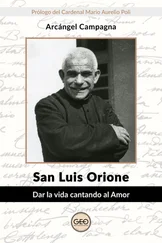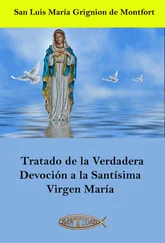Two days later they started back to Lima, and while crossing the bridge of San Luis Rey the accident which we know befell them.
ONE morning twin boys were discovered in the foundlings’ basket before the door of the Convent of Santa María Rosa de las Rosas. Names were found for them almost before the arrival of the wet-nurse, but the names were not as useful to them as our names are to most of us, for no one ever succeeded in telling the boys apart. There was no way of knowing who their parents were, but Limean gossips, noticing as the boys grew older how straight they held themselves and how silent and sombre they were, declared them to be Castilian and laid them in turn at all sorts of crested doorways. The person in the world who came nearest to being their guardian was the Abess of the Convent. Madre María del Pilar had come to hate all men, but she grew fond of Manuel and Esteban. In the late afternoon she would call them into hero office, send for some cakes from the kitchen, and tell them stories about the Cid and Judas Maccabeus and the thirty-six misfortunes of Harlequin. She grew to love them so, that she would catch herself gazing deep into their black and frowning eyes, looking for those traits that would appear when they grew to be men, all that ugliness, all that soullessness that made hideous the world she worked in. They grew up about the convent until they were a little past the age when their presence began to be a slight distraction to the dedicated sisters. From thence they became vaguely attached to all the sacristies in town: they trimmed all the cloister hedges; they polished every possible crucifix; they passed a damp cloth once a year over most of the ecclesiastical ceilings. All Lima knew them well. When the priest rushed through the streets carrying his precious burden into a sickroom either Esteban or Manuel was to be seen striding behind him, swinging a censer. As they grew older, however, they showed no desire for the clerical life. They gradually assumed the profession of the scribe. There were few printing presses in the New World and the boys soon made a fair living transcribing comedies for the theatre, ballads for the crowds, and advertisements for the merchants. Above all they were the copyists of the choirmasters and made endless parts of the motets of Morales and Vittoria.
Because they had no family, because they were twins, and because they were brought up by women, they were silent. There was in them a curious shame in regard to their resemblance. They had to live in a world where it was the subject of continual comment and joking. It was never funny to them and they suffered the eternal pleasantries with stolid patience. From the years when they first learned to speak they invented a secret language for themselves, one that was scarcely dependent on the Spanish for its vocabulary, or even for its syntax. They resorted to it only when they were alone, or at great intervals in moments of stress whispered it in the presence of others. The Archbishop of Lima was something of a philologist; he dabbled in dialects; he had even evolved quite a brilliant table for the vowel and consonant changes from Latin into Spanish and from Spanish into Indian-Spanish. He was storing up notebooks of quaint lore against an amusing old age he planned to offer himself back on his estates outside Segovia. So when he heard one day about the secret language of the twin brothers, he trimmed some quills and sent for them. The boys stood humiliated upon the rich carpets of his study while he tried to extract from them their bread and tree and I see and I saw . They did not know why the experience was so horrible to them. They bled. Long shocked silences followed each of the Archbishop’s questions, until finally one or the other mumbled an answer. The priest thought for a while that they were merely in awe before his rank and before the luxury of his apartment, but at last, much perplexed, he divined the presence of some deeper reluctance and sadly let them go.
This language was the symbol of their profound identity with one another, for just as resignation was a word insufficient to describe the spiritual change that came over the Marquesa de Montemayor on that night in the inn at Cluxambuqua, so love is inadequate to describe the tacit almost ashamed oneness of these brothers. What relationship is it in which few words are exchanged, and those only about the details of food, clothing and occupation; in which the two persons have a curious reluctance even to glance at one another; and in which there is a tacit arrangement not to appear together in the city and to go on the same errand by different streets? And yet side by side with this there existed a need of one another so terrible that it produced miracles as naturally as the charged air of a sultry day produces lightning. The brothers were scarcely aware of it themselves, but telepathy was a common occurrence in their lives, and when one returned home the other was always aware of it when his brother was still several streets away.
Suddenly they discovered that they were tired of writing. They went down to the sea and found an occupation in loading and unloading vessels, not ashamed of working side by side with Indians. They drove teams across the provinces. They picked fruit. They were ferrymen. And always they were silent. Their sombre faces took on from these labors a male and gypsy cast. Their hair was seldom cut and under the dark mat their eyes looked up suddenly surprised and a little sullen. All the world was remote and strange and hostile except one’s brother.
But at last the first shadow fell across this unity and the shadow was cast by the love of women. They had returned to the city and resumed the copying of parts for the theatre. One night the manager, foreseeing a thinning house, gave them a free admission. The boys did not like what they found there. Even speech was for them a debased form of silence; how much more futile is poetry which is a debased form of speech. All those allusions to honour, reputation, and the flame of love, all the metaphors about birds, Achilles and the jewels of Ceylon were fatiguing. In the presence of literature they had the same darkling intelligence that stirs for a time behind the eyes of a dog, but they sat on patiently, gazing at the bright candles and the rich clothes. Between the acts of the comedy the Perichole stepped out of her role, put on twelve petticoats and danced before the curtain. Esteban had some copying still to do, or pretended so, and went home early; but Manuel stayed on. The red stockings and shoes of the Perichole had made their impression.
Both brothers had fetched and carried their manuscripts up and down the dusty stairs behind the stage. There they had seen an irritable girl in a soiled bodice mending her stockings before a mirror while her stage director read aloud her lines for memorization. She had let fall upon the boys for a moment the detonation of her amazing eyes, immediately dissipated in her amused recognition that they were twins. Forthwith she had dragged them into the room and placed them side by side. Carefully, amusedly and remorselessly she had peered into every square inch of their faces, until finally laying one hand on Esteban’s shoulder she had cried out: “This one is the younger!” That had been several years before and neither brother had thought of the episode again.
Henceforth all Manuel’s errands seemed to lead him past the theatre. Late at night he would drift about among the trees beneath her dressing-room window. It was not the first time that Manuel had been fascinated by a woman (both brothers had possessed women, and often, especially during their years at the waterfront; but simply, latinly), but it was the first time that his will and imagination had been thus overwhelmed. He had lost that privilege of simple nature, the dissociation of love and pleasure. Pleasure was no longer as simple as eating; it was being complicated by love. Now was beginning that crazy loss of one’s self, that neglect of everything but one’s dramatic thoughts about the beloved, that feverish inner life all turning upon the Perichole and which would so have astonished and disgusted her had she been permitted to divine it. This Manuel had not fallen in love through any imitation of literature. It was not of him, at all events, that the bitterest tongue in France had remarked only fifty years before: that many people would never have fallen in love if they had not heard about it. Manuel read little; he had only been once to the theatre (where above all there reigns the legend that love is a devotion) and the Peruvian tavern-songs that he might have heard, unlike those of Spain, reflected very little of the romantic cult of an idealized woman. When he said over to himself that she was beautiful and rich and fatiguingly witty and the Viceroy’s mistress, none of these attributes that made her less obtainable had the power to quench his curious and tender excitement. So he leaned against the trees in the dark, his knuckles between his teeth, and listened to his loud heart-beats.
Читать дальше












